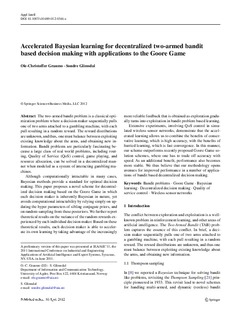| dc.contributor.author | Granmo, Ole-Christoffer | |
| dc.contributor.author | Glimsdal, Sondre | |
| dc.date.accessioned | 2012-09-04T11:41:22Z | |
| dc.date.available | 2012-09-04T11:41:22Z | |
| dc.date.issued | 2012 | |
| dc.identifier.citation | Granmo, O.-C., & Glimsdal, S. (2012). Accelerated Bayesian learning for decentralized two-armed bandit based decision making with applications to the Goore Game. Applied Intelligence, 1-10. doi: 10.1007/s10489-012-0346-z | no_NO |
| dc.identifier.issn | 0924-669X | |
| dc.identifier.uri | http://hdl.handle.net/11250/137969 | |
| dc.description | Published version of an article in the journal: Applied Intelligence. Also available from the publisher at: http://dx.doi.org/10.1007/s10489-012-0346-z | no_NO |
| dc.description.abstract | The two-armed bandit problem is a classical optimization problem where a decision maker sequentially pulls one of two arms attached to a gambling machine, with each pull resulting in a random reward. The reward distributions are unknown, and thus, one must balance between exploiting existing knowledge about the arms, and obtaining new information. Bandit problems are particularly fascinating because a large class of real world problems, including routing, Quality of Service (QoS) control, game playing, and resource allocation, can be solved in a decentralized manner when modeled as a system of interacting gambling machines. Although computationally intractable in many cases, Bayesian methods provide a standard for optimal decision making. This paper proposes a novel scheme for decentralized decision making based on the Goore Game in which each decision maker is inherently Bayesian in nature, yet avoids computational intractability by relying simply on updating the hyper parameters of sibling conjugate priors, and on random sampling from these posteriors. We further report theoretical results on the variance of the random rewards experienced by each individual decision maker. Based on these theoretical results, each decision maker is able to accelerate its own learning by taking advantage of the increasingly more reliable feedback that is obtained as exploration gradually turns into exploitation in bandit problem based learning. Extensive experiments, involving QoS control in simulated wireless sensor networks, demonstrate that the accelerated learning allows us to combine the benefits of conservative learning, which is high accuracy, with the benefits of hurried learning, which is fast convergence. In this manner, our scheme outperforms recently proposed Goore Game solution schemes, where one has to trade off accuracy with speed. As an additional benefit, performance also becomes more stable. We thus believe that our methodology opens avenues for improved performance in a number of applications of bandit based decentralized decision making. | no_NO |
| dc.language.iso | eng | no_NO |
| dc.publisher | Springer | no_NO |
| dc.subject | bandit problems | no_NO |
| dc.subject | Goore Game | no_NO |
| dc.subject | Bayesian learning | no_NO |
| dc.subject | decentralized decision making | no_NO |
| dc.subject | quality of service control | no_NO |
| dc.subject | wireless sensor networks | no_NO |
| dc.title | Accelerated Bayesian learning for decentralized two-armed bandit based decision making with applications to the Goore Game | no_NO |
| dc.type | Journal article | no_NO |
| dc.type | Peer reviewed | no_NO |
| dc.subject.nsi | VDP::Mathematics and natural science: 400::Mathematics: 410::Applied mathematics: 413 | no_NO |
| dc.subject.nsi | VDP::Technology: 500::Information and communication technology: 550::Computer technology: 551 | no_NO |
| dc.source.pagenumber | 1-10 | no_NO |
| dc.source.journal | Applied Intelligence | no_NO |
